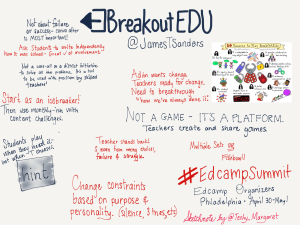I first became enamored of the EdCamp movement about five years ago when I started on Twitter. (Funny how so many of my journeys began when I discovered Twitter!) I subsequently found numerous articles in education magazines and blogs detailing this exciting, grass-roots professional development movement by teachers for teachers. The "unconference", it seemed, could revolutionize and personalize PD in a way I had not previously experienced.
It was not until the fall of 2014 that I was able to attend a semi-local EdCamp -- EdCampUNY in Queensbury, NY. What a fantastic experience! Coincidentally, I met Rachel Murat, a social studies teacher from Maine Endwell with whom I had previously connected on Twitter. One of the greatest things I have found about connecting with professionals in the virtual world is how strong the instant connections are once we meet face to face (IRL). I also connected with Christina Luce from Liverpool, and the three of us were part of the organizing force behind the first EdCampCNY in July 2014.
Less than a month later, Christina contacted me to collaborate on the second EdCampCNY. There was a funding opportunity that was too good to pass up, so we jumped on it. A few kinks in the machine later, we successfully ran the second small but sincere EdCampCNY. I was hooked!
When the EdCamp Foundation sent out word about the first Organizer Summits, I jumped at the chance to reach the next level of learning. I was not disappointed. Truly, the experience and subsequent fallout were more than I could have anticipated. I periodically checked the RSVP list, just to make sure I wasn't dreaming some of the names I saw (Adam Bellow!!!). But after the weekend summit, I finally learned that one of the greatest parts of EdCamp is that no matter how well known any attendee might be, no matter how much of a rockstar, no matter how many Twitter followers, how many books published, at EdCamp, we are all equals. Part of the EdCamp philosophy is "check your ego at the door", which is an easy platitude to spout, but which was truly demonstrated at every step of the summit.
I met some great people right away at the opening session, despite my normal discomfort in groups of people who are unfamiliar to me. Once we broke into sessions I immediately connected with Fran Siracusa, who I mentioned two posts ago (which was only three days ago...some kind of record for me, I think, so I must make note of it!). My discussions with Fran in the session about Global/Virtual EdCamps convinced me to (re)download Voxer onto my phone. She added me to the EdCamp Virtual Voxer Group. The group is currently inactive, because EdCamp Voxer is not until July, but my mind is officially BLOWN by the idea of a virtual EdCamp!
Over dinner, I met two other fantastic educators with whom I am extraordinarily grateful to be connected. Margaret Sisler, a tech coach out of Virginia whose sketchnotes gave a fantastic summary of the sessions she attended:
The connection that I made that so far has had just an overwhelming impact and exponentially increased my professional connections is Sarah Thomas. What an educational powerhouse in such a humble and human individual. Sarah is the creator of EduMatch which, although billed as an "Educational Matchmaker" has absolutely nothing to do with dating. (No, really.) Here's the thinglink image to really demonstrate the reach of EduMatch:

So, having just rejoined the Voxer world, I started with the EduMatch Voxer group. Holy Active Batman! Easily I receive 150 Voxes a day. It is very easy to fall behind, but the conversations are so interesting, and unlike Twitter, known as a microblog, most of the exchanges on Voxer are what I might call micropodcasts, because they are voice recordings. That is not to say that texting isn't an option, because there are members who prefer to text, or there are simply times when it makes more sense. Images are shared as well.
The snowball effect certainly happened here. One of our threads in the EduMatch Voxer group let me to request being added to the Snapchat! Oh Snap! Voxer group on using Snapchat in the classroom. Because clearly I needed another tech tool to become obsessed with. Or not. But there it is.
And then Sarah posted a list of Voxer groups for educators. Did I start this post by saying Wow is the word? To make a long story short, I am now a member of the following groups: Connected Educators, Breakout Edu Chit Chat, #satchat Voxer, Gamification in Edu, Seulement Français, and Solamente Español. Oh wait, I forgot Genius Hour, Makerspaces, PBL, and 20% Time. Now none of these groups is as active as EduMatch, but the connections are valuable nonetheless.
And that's just the first EduMatch tool. The reach of the potential connections is endless. Truly. This is the tip of an enormous iceberg. Also the end of this post, because there are so many more things that need their own posts to be fully explained. Can I get another one in before the weekend?
What are your EdCamp experiences? If you haven't yet attended one, what's stopping you?


